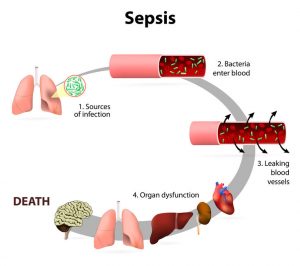Sepsis – early warning and false-alarms
 Whilst the abstraction on our UCC trial grinds on, I am taking advantage of the analytical ‘lull’ pending data to review the literature on Sepsis.
Whilst the abstraction on our UCC trial grinds on, I am taking advantage of the analytical ‘lull’ pending data to review the literature on Sepsis.
Sepsis is a life-threatening response to infection that can lead to tissue damage, organ failure and death.
For years, sepsis has been underdiagnosed and The Sepsis Trust estimates that every 3.5 seconds somebody dies of sepsis.
SortED does include a checklist for ‘Suspected sepsis’. Given how rapidly our nurses identified the need for antibiotics during our ED trial (median 1.45 minutes after first seeing the patient), whereas IV antibiotics were ordered at a median 112 minutes (IQR 74.5 – 156.5) post arrival by ICHT clinicians, we should, in theory, be able to save more patients.
Attempts to standardise and tighten definitions of sepsis are the result of three international efforts in 1991, 2001 and more recently ‘Sepsis-3’ in 2016. The second conference decided that the earlier SIRS definition (Septic Inflammatory Response Syndrome) was being overly sensitive and lacking in specificity. The third conference defined SOFA (Sequential Organ Failure Assessment) and quick SOFA (qSOFA) criteria.
The qSOFA test did improve specificity in the identification of patients with poor outcomes. However a recent secondary study of two septic shock resuscitation trials (reviewed by Stirling et al. Critical Care Medicine Journal 2017) compared the 1991 criteria, which identified 470 patients, versus Sepsis-3 definition of septic shock which only identified a sub-set of 200 patients. This study showed that the new criteria missed out on a large proportion of patients who had significant risk of death (14% mortality). It seems that Sepsis-3, in striving for more specificity, somewhat threw the baby out with the bathwater!
Several NHS Trusts have attempted to implement sepsis alert systems, but reports suggest they are generating an unsatisfactory rate of false alarms, hence at risk of being ignored. The triad of tachycardia, hypotension and raised lactate is too non-specific. SortED’s sepsis alert system will need to do better.
Gillie Francis – Apr 2018


